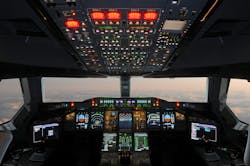Acubed CEO talks AI innovations for aerospace
SUNNYVALE, Calif. - Dr. Victoria Coleman, CEO of Acubed, gave Aviation Pros an inside look at the technological transformations and AI projects she’s overseeing. As the former Director of DARPA and Chief Scientist for the U.S. Air Force, Coleman has led several impactful initiatives, such as passing the CHIPS for America act to aid in domestic semiconductor manufacturing, Emily Gorski writes for AviationPros. Continue reading original article.
The Military & Aerospace Electronics take:
24 June 2025 - Acubed is the Silicon Valley-based innovation center of Airbus, focused on accelerating technological advancements for the aviation industry. Its CEO, Dr. Victoria Coleman, recently offered Aviation Pros a behind-the-scenes look at the organization’s current technological initiatives, many of which revolve around artificial intelligence.
A former Director of DARPA and Chief Scientist of the U.S. Air Force, Coleman has spearheaded major efforts, including supporting the CHIPS for America Act to bolster domestic semiconductor production. She also led Project VENOM, a $300 million program to retrofit six F-16s for autonomous flight testing as part of the Pentagon’s Collaborative Combat Aircraft strategy.
One initiative Coleman highlighted is Wayfinder, a program to enhance single-aisle jets like the A320. A key component, the Visual Landing System (VLS), uses computer vision to help aircraft identify and align with runways autonomously. "We asked, why not give the plane eyes?" Coleman said. “The idea is for the aircraft to visually recognize the runway and land itself.”
Over the past four years, the VLS team has conducted tens of thousands of test flights and collected nearly 10 petabytes of data to train its AI models. "We’ve progressed from sunny-day landings in Toulouse to all-weather operations across U.S. airports," Coleman said.
Related: Airbus concludes ATTOL with fully autonomous flight tests
Related: AI enables predictive analysis in MRO
Jamie Whitney, Senior Editor
Military + Aerospace Electronics
